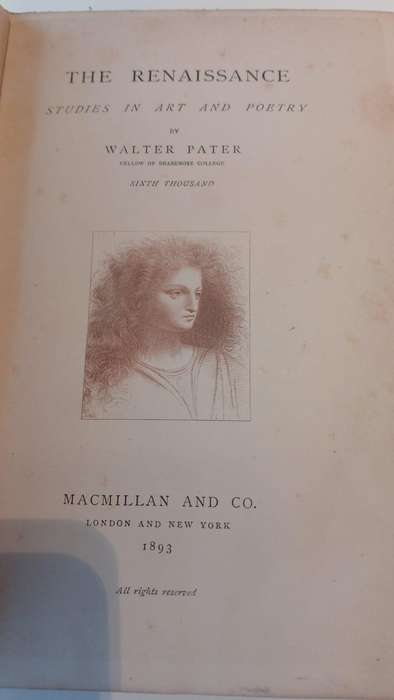
The Renaissance, studies in art and poetry by Walter Pater (1893) - (manifesto of Aestheticism)
Check my rate
| Main centres: | 1-3 business days |
| Regional areas: | 3-4 business days |
| Remote areas: | 3-5 business days |

| Main centres: | 1-3 business days |
| Regional areas: | 3-4 business days |
| Remote areas: | 3-5 business days |
Published by Macmillan, 1893, hardcover, 253 pages, no dust jacket, condition: very good.
Walter Horatio Pater (1839 1894) was an English essayist, art and literary critic, and fiction writer, regarded as one of the great stylists. His first and most often reprinted book, Studies in the History of the Renaissance (1873), revised as The Renaissance: Studies in Art and Poetry (1877), in which he outlined his approach to art and advocated an ideal of the intense inner life, was taken by many as a manifesto (whether stimulating or subversive) of Aestheticism.
The Leonardo essay contains Pater's celebrated reverie on the Mona Lisa ("probably still the most famous piece of writing about any picture in the world"; the Botticelli essay was the first in English on this painter, contributing to the revival of interest in him; while the Winckelmann essay explored a temperament with whom Pater felt a strong affinity. An essay on 'The School of Giorgione' (Fortnightly Review, 1877), added to the third edition (1888), contains Pater's much-quoted maxim "All art constantly aspires towards the condition of music" (i.e. the arts seek to unify subject-matter and form, and music is the only art in which subject and form are seemingly one). The final paragraphs of the 1868 William Morris essay were reworked as the book's 'Conclusion'.
This 'Conclusion' was to be Pater's most influential and controversial publication. It asserts that our physical lives are made up of scientific processes and elemental forces in perpetual motion, "renewed from moment to moment but parting sooner or later on their ways". In the mind "the whirlpool is still more rapid": a drift of perceptions, feelings, thoughts and memories, reduced to impressions "unstable, flickering, inconstant", "ringed round for each one of us by that thick wall of personality"; and "with the passage and dissolution of impressions... [there is a] continual vanishing away, that strange, perpetual weaving and unweaving of ourselves". Because all is in flux, to get the most from life, we must learn to discriminate through "sharp and eager observation": for every moment some form grows perfect in hand or face; some tone on the hills or the sea is choicer than the rest; some mood of passion or insight or intellectual excitement is irresistibly real and attractive for us, for that moment only.